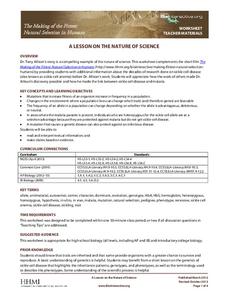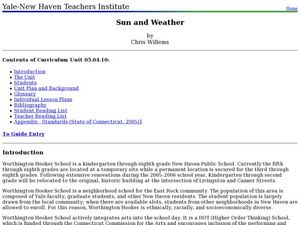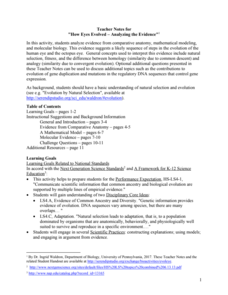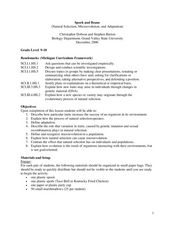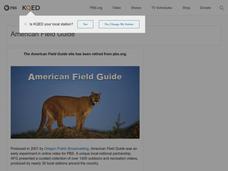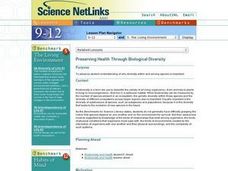Virginia Department of Education
Adaptation and Evolution
Um may be the atomic symbol for confusion, but it won't be needed in this lesson. Scholars rotate through seven stations completing experiments, hands-on activities, writing exercises, and analysis. Stations include material on...
Howard Hughes Medical Institute
Stickleback Evolution Virtual Lab
How quickly do animals evolve? Can comparing different samples of the same fossil answer timeline questions? Scholars use virtual labs to examine fossils and learn about stickleback evolution. They compare pelvic morphology in lakes...
Howard Hughes Medical Institute
A Lesson on the Nature of Science
If you are looking for a great way to present natural selection in humans, look no further. This handout is intended to accompany the 14-minute video The Making of the Fittest: Natural Selection in Humans, which can be found on the...
Michigan State University
Bug Lyphe!
Introduce ecology classes to biodiversity and interdependence in ecosystems with a PowerPoint presentation. Then, they get up-close and personal with the invertebrate world by collecting insects, classifying them, and graphing their...
Biology Junction
Introduction to Biology
Welcome to Biology! Introduce pupils to a subject conceptualized by Aristotle in 300 BC through a presentation and worksheet. It covers the themes of biology, characteristics of life, the scientific method, microscopes, and measurements.
Curated OER
Sun and Weather
How is the Earth's weather created? Middle schoolers will explain how the Sun's energy is transformed into different forms. They will perform mathematical calculations of volume, mass, and temperature. They they will explain the...
Curated OER
Biodiversity Activity
Students are introduced to biodiversiy. They use a simulation of two forests, one planted with only Douglas Fir trees, and one with diverse species of trees. Students also use the simulation of two forests, one a monoculture of only one...
Serendip
How Eyes Evolved – Analyzing the Evidence
Octopodes existed for hundreds of thousands of years before humans, yet our eyes share many similarities. Scholars analyze the evidence to determine if the evolution of eyes best fits a homology or analogy model. They discuss the issue...
Curated OER
Taming Wild Land
Third graders consider the habitat needs of living things and how extensive farming in an area can affect the plants and animals of a region. They participate in a simulation to show how changing the habitat in one area can greatly...
Curated OER
Tropical Forest Food Chain
Learners explore the interdependence of the animals and plants in tropical rainforests. They explore the importance of conserving biodiversity and tropical food chains. They create a tropical forest food chain and identify species that...
Curated OER
Comparing mtDNA Sequences to Learn about Human Variation
This computer-based lesson will enable students to test their notions of "racial" similarity and difference by comparing mtDNA sequences as the students do in the first episode of RACE - The Power of an Illusion.
Curated OER
Spork and Beans
Students examine natural selection, how it works and how it can cause microevolution. In this evolution lesson students complete a lab activity that shows the effects that natural selection has on organisms.
Curated OER
Wilderness
Young scholars examine the dynamic between animals and humans in the wilderness. They work together in groups share their journal entries when asked to reflect on natural areas.
Curated OER
Evolution Lab
Students examine the pattern of natural variation in a society. They examine Darwin's theory of evolution and analyze data. They use computer programs to graphically display the variation in organisms.
Curated OER
Flowers and Plants
Students are assigned to bring five flowers. They explore flowers to distinguish different physical features of flowers. They compare and contrast different flowers to determine what features they have in common. Students develop an...
Curated OER
Tracking Down Traits
Sixth graders list traits that all sixth graders share. They receive worksheets "Tracking Down Traits," working in groups to complete the chart. Students share results with the class and a class summary is tallied. Students discuss the...
Curated OER
The Rise and Fall of the Mammoths
Students develop an understanding of the evolution of species in the context of the woolly mammoth. They examine the fossil record to explain natural selection.
Curated OER
How Hazardous Substances Affect People
Students examine the health effects of hazardous waste on people. They work together to complete an experiment in which worms are exposed to chemicals. They discuss the results of the test.
Curated OER
Molecular Approaches to Evolution
Students examine the molecular studies of organisms that have led to a new era in their understanding of speciation and evolutionary relationships. Students study the allelic frequency of genes controlling specific molecules and assess...
Curated OER
Natural Selection
Students practice calculating allele and genotype frequencies in the framework of a simple simulation using hard candy, calculators, and a worksheet. This lesson includes a three-page worksheet and an assessment question for conclusion.
Curated OER
Scavenger Hunt: A Group Collection
Learners be complete a collection of living organisms and systems from the school campus.
Curated OER
Preserving Health Through Biological Diversity
Young scholars research and explore the benefits of biodiversity, particularly as it relates to human health. They write an essay in which they explain the possible effect of human activities on the emergence of new diseases.
Curated OER
The Electrophoresis of Human Hemoglobin
Learners are presented with a scenario that requires them to electrophoreses human hemoglobin samples in order to confirm a diagnosis of sickle cell anemia and/or to determine whether individuals in the scenario are carriers of the...
Curated OER
Science Lesson: Chocolate Flavored Cherries
Young scholars are able to identify start and stop sequences in DNA. They are able to model using restriction enzyme and ligase to remove sections of DNA and reattach them. Students are introduced to the process of recombinat DNA...
Other popular searches
- Population Genetics 11 Grade
- Population Genetics Bunnies
- Population Genetics Lab
- Population Genetics Rabbit




